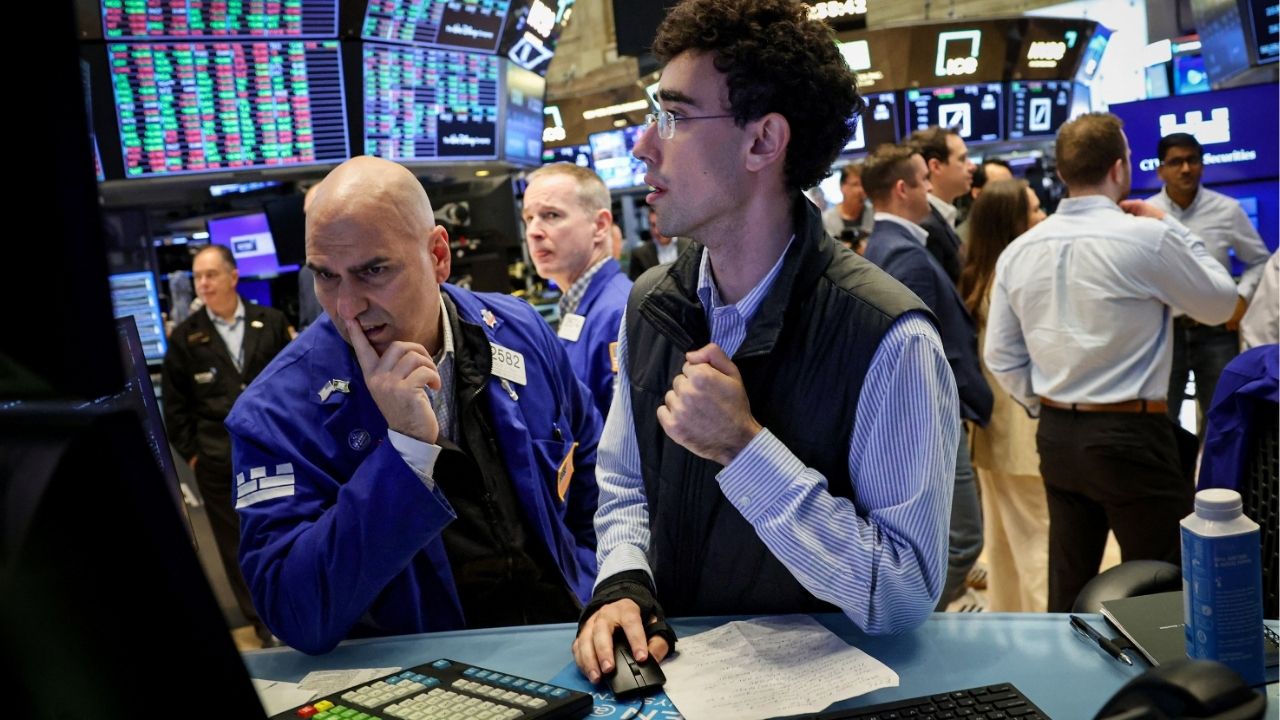Specialist traders work on the floor at the New York Stock Exchange (NYSE) in New York City, U.S., September 15, 2025. (Reuters File)
Share
|
Getting your Trinity Audio player ready...
|
Wall Street’s main indexes dipped on Tuesday as renewed concerns over a U.S.-China trade conflict dampened sentiment, while investors parsed results from big U.S. banks, which kicked off the third-quarter reporting season.
BlackRock’s assets under management hit a record $13.46 trillion and JPMorgan Chase raised its full-year forecast for net interest income after beating expectations for third-quarter profit. BlackRock’s shares rose 0.7% in choppy trading, while JPMorgan dipped 4.1%.
Goldman Sachs fell 4.6% despite beating Wall Street expectations for quarterly profit.
Citigroup slipped 0.9% and Wells Fargo rose 2.9% after beating estimates for third-quarter profit.
The S&P 500 banking index, which has outperformed the S&P 500 this year, dropped 1.4% despite strong results from major lenders.
“The most important thing to think about is not the actual earnings, which in large part were better across the board … but all of them are also trading at or near all-time highs,” said Art Hogan, chief market strategist at B Riley Wealth, on why many lenders’ shares were lower despite reporting strong quarterly results.
The earnings reports will help investors assess the impact of tariffs on corporate America and offer fresh clues on the economy at a time when major official data releases remain delayed due to an ongoing government shutdown.
Investor focus will also be on Federal Reserve Chair Jerome Powell’s speech at the NABE annual meeting for further insight into the U.S. central bank’s monetary policy path.
At 10:08 a.m. ET, the Dow Jones Industrial Average fell 321.93 points, or 0.70%, to 45,745.65, the S&P 500 lost 55.76 points, or 0.85%, to 6,598.96 and the Nasdaq Composite lost 305.14 points, or 1.34%, to 22,389.47.
Tech Stocks Hit Markets
The S&P 500 tech sector lost 1.8%. Nvidia fell 3.5%. Broadcom tumbled 4.2% a day after it surged almost 10% on its partnership with OpenAI.
The losses in tech stocks also weighed on the Nasdaq.
The S&P 500 consumer discretionary stocks declined 1.3%, with Tesla down about 3%. Defensive play consumer staples rose 0.5%.
Markets had rebounded in the previous session after President Donald Trump’s conciliatory tone on trade tensions with China as well as Treasury Secretary Scott Bessent’s comments that the U.S.-China meet later this month remained on track.
On Tuesday, Washington and Beijing began charging additional port fees on ocean shipping firms after Trump’s threat to impose additional 100% tariffs on Chinese goods on Friday over Beijing’s rare earths export controls knocked Wall Street’s main indexes off their record levels.
Additionally, the International Monetary Fund edged up its 2025 global growth forecast on tariff shocks and financial conditions being more benign than expected, while warning that a renewed U.S.-China trade war could slow output significantly.
Among other moves, U.S.-listed shares of Chinese companies fell. Alibaba Group and JD.com declined 3%, and 2.5%, respectively.
Declining issues outnumbered advancers by a 1.59-to-1 ratio on the NYSE and by a 1.84-to-1 ratio on the Nasdaq.
The S&P 500 posted eight new 52-week highs and seven new lows, while the Nasdaq Composite recorded 29 new highs and 76 new lows.
—
(Reporting by Sukriti Gupta and Twesha Dikshit in Bengaluru; Editing by Maju Samuel)
RELATED TOPICS:
Categories

California Discourages Wild Mushroom Foraging After Fatal Outbreak


















